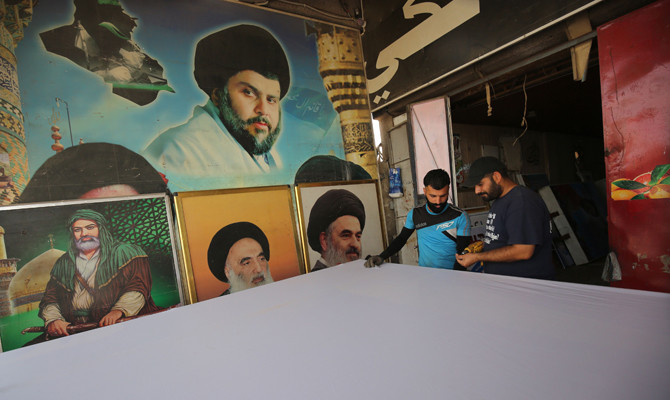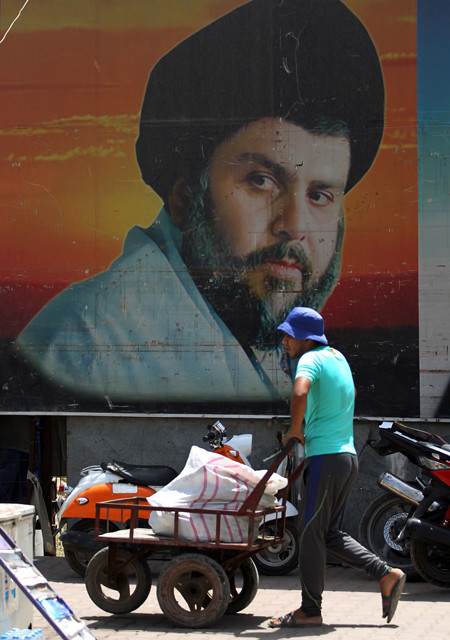BAGHDAD: Muqtada Al-Sadr, the radical cleric now playing the role of kingmaker in Iraq, recently accused rivals of seeking to prevent him from forming a government and suggested his life was in danger.
Within hours, hundreds of his young supporters had gathered in front of his house in Najaf last week baying for blood.
Videos circulated showing the men and their families carrying rocket-propelled grenade launchers and threatening to “burn” everything if “anyone hit Al-Sadr or robbed” him of his right to form the next administration.
“If you try to touch Mr. Muqtada, you will not be left with anything, even the baby: We will kill him in his bed,” one of the men said. “We will shake the earth under your feet.”
The success of Al-Sadr’s Sairoon alliance in elections this month has raised fears that the cleric’s millions of obsessive followers, known as Sadrists, may spark violence if the government-forming process runs into trouble. For many Iraqis, the memories of the atrocities of Al-Sadr’s militia, the Mehdi Army, in the years after Saddam Hussein’s downfall, are all too fresh.
Most Sadrists are regarded as fanatics, badly educated, usually unemployed and from some of Iraq’s poorest areas. They see Muqtada Al-Sadr as a saint for whom they must sacrifice their lives. They also believe his ideas should not be contradicted or discussed, and his opponents deserve death or severe injury.
“All signs indicate that the situation is getting worse,” Mustafa, a Shiite human rights activist, told Arab News while monitoring the reactions of Al-Sadr’s followers on social media.
“I will wait a little, if they (Sadrists) form the government I will leave the country. I am ready to clean the bathrooms in any country to get away from them.
“They will hunt us one by one and will not stop until they terminate us.”
Sadrists were originally followers of Muqtada’s father, Grand Ayatollah Mohammed Al-Sadr, who was killed in 1999 after defying Saddam Hussein.
After the 2003 US-led invasion toppled the dictator, Muqtada Al-Sadr formed his armed wing, the Mehdi Army “to fight the occupiers and their allies,” including translators, journalists and activists.
The poor and unemployed young Sadrists represented the backbone of the Mehdi Army.
After numerous battles against US troops and Iraqi security forces, the Mehdi Army became deeply involved in the sectarian war that tore Iraq apart between 2006 and 2008.
The role played by Sadrists in curbing mass killings carried out by radical Sunni militant groups against Shiites in that period strengthened their sense of superiority over the rest of the Shiite factions. The government’s inability to stand up to them prompted thousands of Sadrists to turn on fellow Shiites, targeting them in robberies or extorting their money.
In 2008, after the Mehdi Army took control of many Shiite cities, including a large part of Baghdad, and Shiites were increasingly the target of killings and extortion, Al-Sadr denied that he had anything to do with the illegal activities of his fighters and decided to freeze the Mehdi Army.
At the same time, the Iraqi government, in cooperation with US troops, launched a military campaign to hunt down Al-Sadr’s fighters across the country.
Since then, the cleric has sought to play a role in reshaping the political process and correcting the mistakes made by the Shiite political forces in recent years. He reinvented himself as the chief “sponsor of reform.”
The Sairoon alliance, formed and sponsored by Al-Sadr, won the highest number of votes in the May 12 parliamentary election, with 54 MPs.
His Shiite rival, the pro-Iranian list of Al-Fattah, came second with 47 seats.
Immediately after the official results were announced, Al-Sadr introduced himself as a power broker, and proceeded to negotiate with all the winning blocs except the State of Law Alliance of Nuri Al-Maliki, the divisive former prime minister.
He plans to form the biggest parliamentary bloc which has the exclusive right to form the government.
The fears among Iraqi people and political parties over Al-Sadr’s new prominence intensified when he said he wanted to form a “patriarchal government” under his supervision.
The comments triggered widespread discussion and criticism among Iraqis who have recalled the period between 2006 and 2008 when Al- Sadr’s followers imposed their vision on others by force.
“Whoever monitors Sadr’s statements knows that the patriarchal government according to Sadr means forming a government subject to Sadr’s will and authority as he is the father who gave birth to this government,” a professor of political science at the University of Baghdad told Arab News.
“People are scared. It does not matter if Al-Sadr will succeed in forming the government or not, a wave of violence in the process of formation may erupt at any moment.
“Will cafes and shops put pictures of Al-Sadr in their facades to show their loyalty and avoid the oppression of his followers as it was 2006? Are we going to see the Mehdi Army control the Shiite street?”
The tweet last week that sparked protesters to gather at his home was the first of several by Al-Sadr, hinting that he may be targeted.
“Our victory has upset many people,” he said, before asking people to read Al-Fatihah, a Qur’anic verse indicating he may be killed at any moment and asking followers to pray for him.
“We are moving on to make reform and we will not compromise,” he said.



















